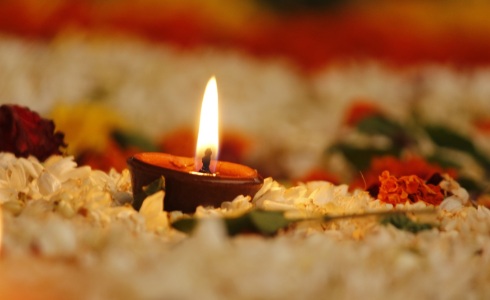The name ‘Diwali’ comes from the Sanskrit term ‘dipavali.’ The conjugated term is derived from ‘dipa’ which means ‘light’ and ‘avali’ which means ‘a row or a series.’ The term ‘dipavali’ thus means ‘a row or a series of lights.’ Diwali is one of the most auspicious festivals in the Hindu culture. This day commemorates the return of Lord Rama from his 14 years of exile during which he fought and won a battle against Ravana. The festival signifies the ‘victory of good over evil, light over darkness, and knowledge over ignorance.’ On this day, people decorate their houses with lights, diyas (clay lamps), rangoli, and flowers.
The Five Day Festival
Since Diwali is the most important festival in India, people start their preparations for weeks before the festival. The festival lasts for five days and each day has a unique significance in the Hindu culture. Diwali begins on the third day of the entire celebration. Here is a list of days celebrated with the festival of Diwali:
- Day 1: Dhanteras
- Day 2: Naraka Chaturdashi, Chhoti Diwali
- Day 3: Lakshmi Puja, Diwali
- Day 4: Annakut, Padwa, Govardhan puja
- Day 5: Bhai Duj, Bhau-Beej
The Rituals
Diwali holds utmost significance as it is a post-harvest festival. Since farming is the most common occupation in India, it yields a major part of the nation’s income, people seek Goddess Laxmi’s blessings on this day. Goddess Laxmi symbolises three virtues: prosperity, fertility, and abundant crops, and it is believed that on this auspicious day, Goddess Laxmi visits the houses of her followers and bestow them with health, wealth, and prosperity.
The Celebrations
People wear new clothes on this day and present gifts to their friends and family members. Usually, people also send Diwali gifts online to their relatives living in different cities/countries. One of the most preferred ways of celebrating this festival amongst youngsters is by playing with firecrackers while the woman of the house draw beautiful rangoli designs on the entrance of their house. It is believed that Goddess Laxmi enters the house that is well-decorated with lights and rangoli.
Diwali is also marked as the annual homecoming of individuals who live far off their hometowns. Students and employees who live away from their family unite on this day and celebrate this festival with utmost zeal. Not only families, but this is a bonding time for communities and associations as well. People living in urban areas and societies attend various events that signify the importance of this festival. Food being a major focus of this festival, different types of dishes and sweets are prepared on this day. Apart from this, various cities also organise fairs, parades, and dance performances in the commemoration of this festival.
We hope that this information would help you realise the significance of Diwali – The Festival of Lights and celebrate this occasion to the fullest. Wishing you a happy and safe Diwali!

